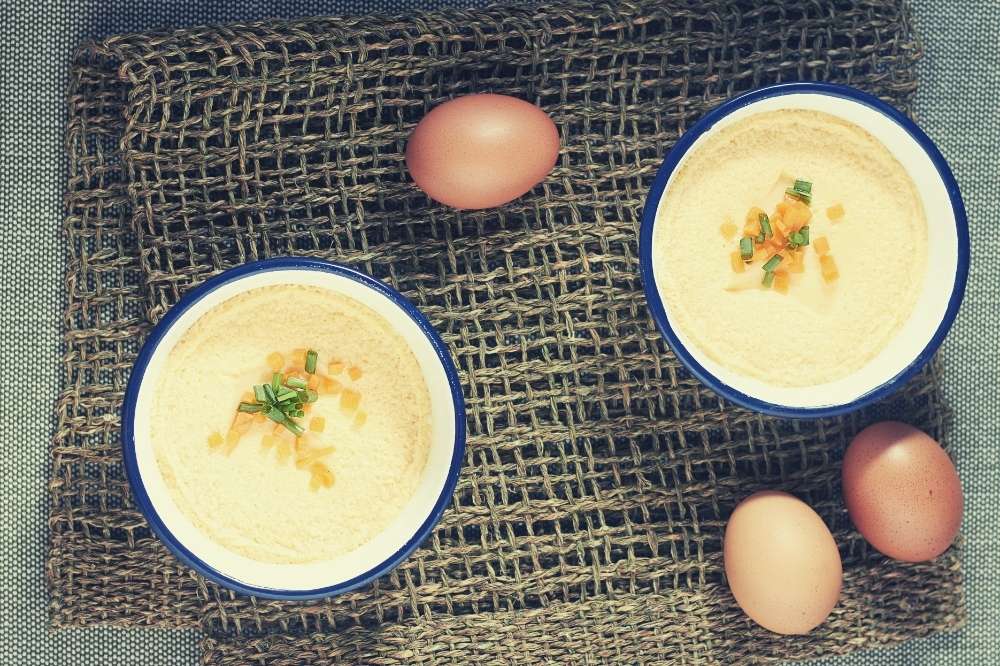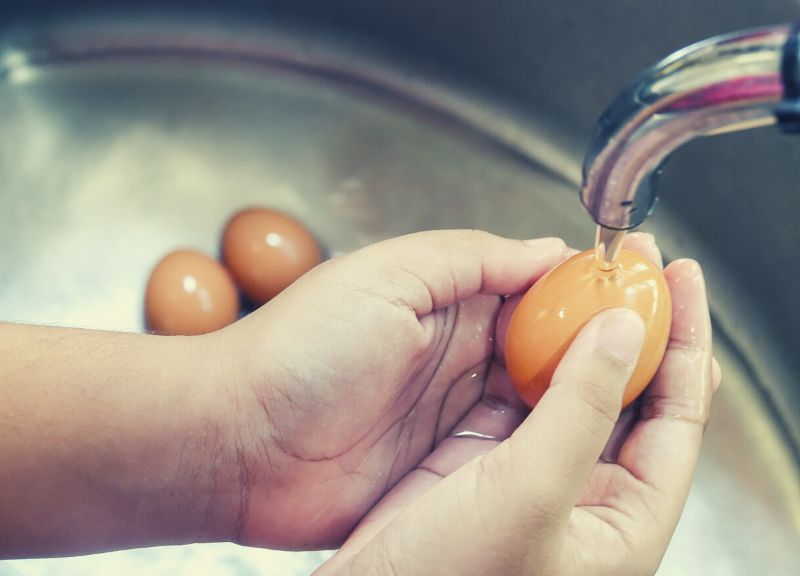Have you ever found yourself in the kitchen with some eggs and wondered if they can be cooked using a steamer?
For those who want to enjoy a healthy, nutritious breakfast without standing at the stove for too long, you’ll be pleased to know that, yes! It is possible to steam eggs in a steamer.
This article will explore how this simple technique works and why it’s an excellent way to cook eggs.
Let’s get into it!
What Are The Benefits Of Steaming Eggs In A Steamer?

Steaming eggs in a steamer is an easy and healthy way to prepare them. Steamed eggs are not only delicious, but they also retain more nutrients than boiled or fried eggs.
When you steam your eggs, you don’t need to add fat or oil for cooking, as the hot air from the steamer cooks them through instead.
This makes them much healthier than other cooking methods and can help reduce your risk of heart disease.
Additionally, steaming preserves most of the egg’s moisture content so it won’t dry out during cooking as boiling does.
Plus, because this preparation method has no added fat or oil, the calorie count will be lower than other methods.
Lastly, when you steam your food using a steamer basket (instead of directly over boiling water), you get even heat distribution that helps cook all sides evenly while preserving flavor and texture better than traditional methods do.
What Type Of Steamer Is Required For Steaming Eggs?
There are several types of steamers that you can use when it comes to steaming eggs.

Electric food steamers are popular, as they allow for precise temperature control and make steaming hassle-free.
Bamboo steamers also work great for steaming eggs as the lid traps in all the moisture from the boiling water below and creates a moist environment for your eggs to cook in.
Stovetop steamers are another good option when cooking egg dishes like tamagoyaki (Japanese omelet).
For those looking to save time, rice cookers with a “steam” setting can be used too. Just remember to add some extra liquid or seasonings if needed.
The bottom line is that it doesn’t matter what type of steamer you choose as long as one is available in your kitchen.
Steaming Versus Boiling Eggs
Regarding cooking eggs, steaming and boiling are two popular methods. Both will result in a delicious egg dish, but you should know some differences between steaming and boiling.
Boiling is the simplest method for preparing eggs. All you need is a pot with enough water to cover your eggs completely and boil over high heat.
Once boiled, lower the temperature so that the water is just simmering before adding your eggs.
Boiling an egg will produce a hard-boiled egg, while removing the shell can be quite difficult as they tend to stick on due to overcooking them during this process.
On the other hand, steaming requires less time than boiling because steam cooks food faster than hot water.
However, it takes more effort to add additional equipment, such as a steamer basket or bamboo basket, for this purpose.
This method prevents overcooking since it only uses indirect heat from hot steam instead of direct contact with boiling water which can easily lead to overcooked yolks or whites if not monitored correctly.
As well as making sure that no shells stick onto your cooked eggs when peeling them off after being cooked by steam makes for easier removal without any mess compared with boiled ones.
How To Choose And Prepare Eggs For Steaming?

Choosing the right eggs for steaming is important in creating a delicious dish. When selecting your eggs, select fresh and good-quality ones from a trusted source.
It’s best to opt for organic, free-range eggs as they will have more flavor and nutrients than regular supermarket varieties. You should also check that the eggshells are intact with no visible cracks or damage before purchasing them.
Once you have chosen the perfect eggs for steaming, it’s time to prepare them properly, so they cook evenly during the process.
Begin by gently washing each egg under cold running water using your hands or a soft cloth to remove any dirt or debris from its surface area.
Once cleaned, lightly tap each one against a hard surface (like your kitchen counter) until there are small cracks all over its shell.
This will help steam penetrate it’s interior more easily when cooking later on.
Finally, carefully place the prepared eggs into a pot filled with an inch of boiling water and wait until they reach the desired result before serving.
How To Steam Eggs In A Steamer?
Steaming eggs in a steamer is a quick and easy way to make an egg dish. To get started, fill the bottom of your steamer with 1 inch of water.
Place your eggs into the top portion of the steamer and cover it with a lid. Turn on your stove and bring the water to a boil, then reduce the heat and let simmer for 8-10 minutes.
Once done, carefully remove the eggs from the steamer using tongs or a spatula, crack them open and enjoy.
Steaming eggs in a steamer is straightforward, but a few things can help ensure perfect results every time.
First, ensure you evenly distribute your eggs throughout the top portion before covering it with a lid, as this will help ensure even cooking times for each one.
Additionally, cook them slightly longer than suggested (up to 12 minutes) if you’re looking for firmer yolks.
Lastly, after removing them from heat, take care when cracking open each egg as they may still be hot!
Similar articles you might be interested in:
FAQs
How Long Do You Steam Eggs In A Steamer?
It usually takes about 10 minutes to steam eggs in a steamer. If you are using large eggs, it may take up to 12 minutes.
For soft-boiled eggs, set your timer for 5-7 minutes, depending on the egg size. Depending on their size, hard-boiled eggs will need around 10-12 minutes.
Can You Steam Eggs In The Microwave?
Yes, you can steam eggs in the microwave. Start by cracking an egg into a microwavable container and adding about 1/4 cup water to each egg. Cover the container with a lid or plate and place it in the microwave oven.
Cook on high power for 30 seconds to 2 minutes, depending on how hard or soft you want your boiled egg to be.
What Should You Not Do When Steaming Eggs?
When steaming eggs, it is important to avoid adding too much water when boiling. Overcooking the egg can also cause them to become rubbery or tough.
Adding salt and other seasonings before steaming is not recommended, as this will alter the flavor of the egg. Additionally, be sure to use a timer to know when the eggs are finished cooking.
Do You Put Hot Or Cold Water In A Food Steamer?
When using a food steamer, it is important to use cold water. Hot water will cause the food to cook too quickly and can result in unevenly cooked or even burnt food.
Cold water allows for more consistent heating throughout the entire cooking process.
Can You Steam Eggs In The Pressure Cooker?
Yes, you can steam eggs in a pressure cooker. Place the eggs into a steaming basket and lower them into the pressure cooker filled with 2 cups water.
Secure the lid and set it to high pressure for 5 minutes, then quickly release when done. Your eggs should be perfectly cooked in just 5 minutes.
Conclusion: Can You Steam Eggs In A Steamer?
Yes, you can steam eggs in a steamer. Steaming eggs can be an easy and healthy way to cook them.
The best part is that you don’t need a lot of equipment or ingredients to make it happen – just your steamer!
With a few simple steps, you can have perfectly cooked eggs in minutes, making them the perfect choice for any meal.
So grab your steamer and crack on some delicious, nutritious eggs today!
Happy cooking!
